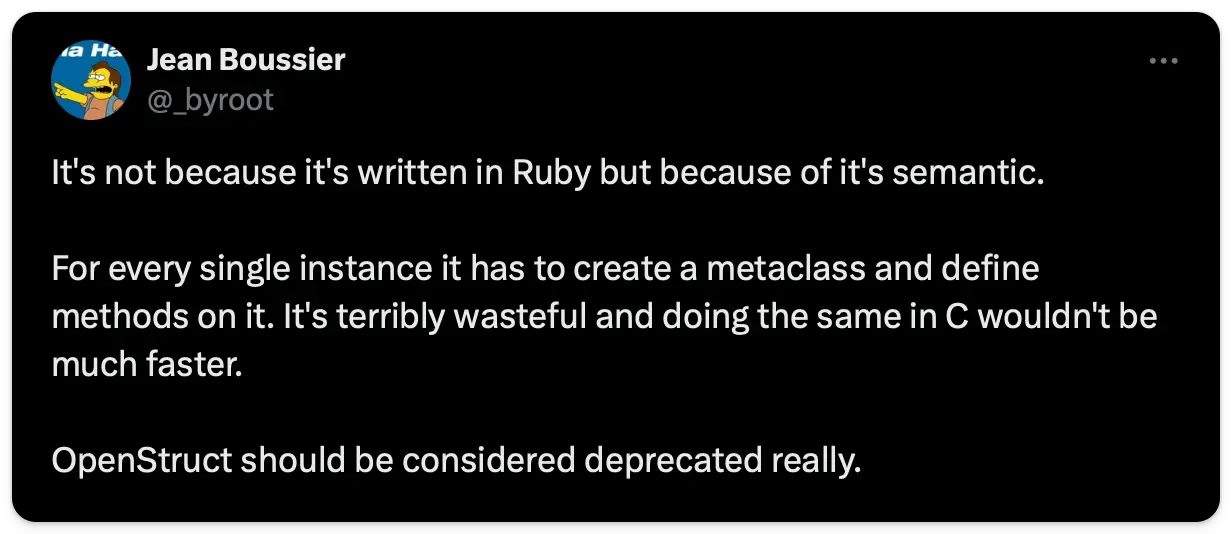Micro benchmarking value objects in Ruby
As I was working on another email part of my Modern Ruby course via email I wanted to make some micro benchmarks on Data.define vs Struct vs OpenStruct
They are not a production-level benchmark, so take them with a grain of salt.
I added all code and results in a repo at https://github.com/lucianghinda/value-object-in-ruby-benchmarks
Creating new objects
When creating a new object, Struct (with keyword_init: true)and Data.define behave almost the same (the differences are with error margin or so small that they are probably due to my setup), while OpenStruct seems to be the slowest.
Having defines the following keys and values:
keys = 1000.times.map { |i| "key#{i}".to_sym } values = 1000.times.map { |i| "value#{i}" } keys_and_values = Hash[keys.zip(values)]
The creation benchmarks are testing the following code:
DataStruct = Struct.new(*keys, keyword_init: true) DataStruct.new(**keys_and_values) # vs DataDefine = Data.define(*keys) DataDefine.new(**keys_and_values) # vs OpenStruct.new(**keys_and_values)
Here is a `bmbm` benchmark result:
Creating a new object - Benchmark with bmbm Rehearsal -------------------------------------------------- Struct.new 0.000023 0.000003 0.000026 ( 0.000024) Data.define 0.000020 0.000001 0.000021 ( 0.000022) OpenStruct.new 0.001705 0.000075 0.001780 ( 0.001780) ----------------------------------------- total: 0.001827sec user system total real Struct.new 0.000020 0.000000 0.000020 ( 0.000020) Data.define 0.000022 0.000000 0.000022 ( 0.000022) OpenStruct.new 0.001069 0.000044 0.001113 ( 0.001132)
Here is the ibs benchmark result:
Creating a new object - Benchmark with ips ruby 3.3.0 (2023-12-25 revision 5124f9ac75) [arm64-darwin23] Warming up -------------------------------------- Struct.new 5.169k i/100ms Data.define 5.361k i/100ms OpenStruct.new 62.000 i/100ms Calculating ------------------------------------- Struct.new 50.086k (± 1.7%) i/s - 253.281k in 5.058450s Data.define 51.646k (± 1.1%) i/s - 262.689k in 5.086990s OpenStruct.new 607.447 (± 0.8%) i/s - 3.038k in 5.001584s Comparison: Data.define: 51646.3 i/s Struct.new: 50085.7 i/s - 1.03x slower OpenStruct.new: 607.4 i/s - 85.02x slower
Here is the memory benchmark result.
Creating a new object - Benchmark with ips Calculating ------------------------------------- Struct.new 36.792k memsize ( 0.000 retained) 2.000 objects ( 0.000 retained) 0.000 strings ( 0.000 retained) Data.define 36.792k memsize ( 0.000 retained) 2.000 objects ( 0.000 retained) 0.000 strings ( 0.000 retained) OpenStruct.new 848.728k memsize ( 0.000 retained) 8.005k objects ( 0.000 retained) 50.000 strings ( 0.000 retained) Comparison: Struct.new: 36792 allocated Data.define: 36792 allocated - same OpenStruct.new: 848728 allocated - 23.07x more
Accessing attributes
Again Data.define and Struct with keyword arguments are the same. On the other side OpenStruct is almost twice as slow.
Having the following data defined:
keys = 1000.times.map { |i| "key#{i}".to_sym } values = 1000.times.map { |i| "value#{i}" } keys_and_values = Hash[keys.zip(values)]
And then defining the following structures:
BigDataS = Struct.new(*keys, keyword_init: true) BigDataD = Data.define(*keys)
The benchmarks are comparing:
keys.each { struct_object.send(_1) } keys.each { data_object.send(_1) } keys.each { opens_struct_object.send(_1) }
Here is the bmbm benchmark result:
Accessing attributes - bmbm test Rehearsal ----------------------------------------------- Struct 0.000069 0.000002 0.000071 ( 0.000071) Data.define 0.000069 0.000003 0.000072 ( 0.000071) OpenStruct 0.000110 0.000003 0.000113 ( 0.000116) -------------------------------------- total: 0.000256sec user system total real Struct 0.000049 0.000001 0.000050 ( 0.000046) Data.define 0.000046 0.000001 0.000047 ( 0.000046) OpenStruct 0.000091 0.000001 0.000092 ( 0.000094)
Here is the ibs benchmark result:
Accessing attributes - ips test ruby 3.3.0 (2023-12-25 revision 5124f9ac75) [arm64-darwin23] Warming up -------------------------------------- Struct 2.857k i/100ms Data.define 2.828k i/100ms OpenStruct 1.384k i/100ms Calculating ------------------------------------- Struct 28.420k (± 0.9%) i/s - 142.850k in 5.026906s Data.define 28.691k (± 0.5%) i/s - 144.228k in 5.027131s OpenStruct 13.475k (± 0.9%) i/s - 67.816k in 5.033315s Comparison: Data.define: 28690.8 i/s Struct: 28419.6 i/s - same-ish: difference falls within error OpenStruct: 13474.6 i/s - 2.13x slower
Context for understanding why Data.define and Struct are similar
Ufuk Kayserilioglu explains why Data.define and Struct with keyword arguments have the same behavior:

A note about OpenStruct
Jean Boussier answered a question about why OpenStruct is so slow:

#buildinpublic #subscribe
Follow along as I build the platform and create the courses
You will get sometimes an weekly email with updates, Ruby on Rails tips and tricks. And I will share early bird prices and discounts with you when the courses are ready.
Sign up for my newsletter here